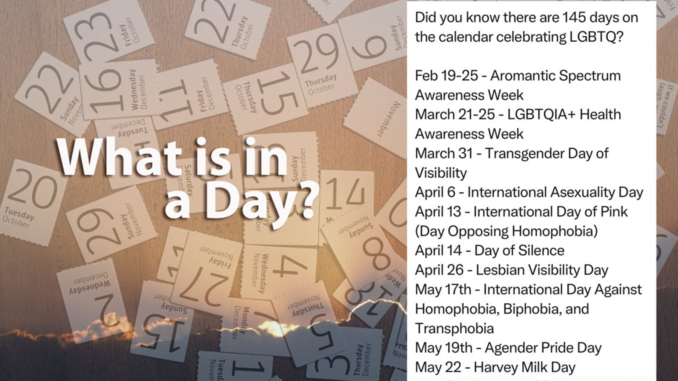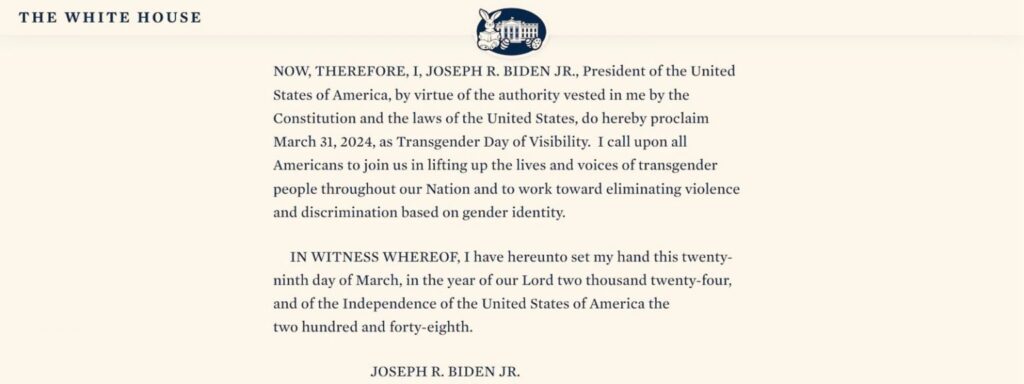
This past weekend, President Joe Biden declared April 1st, Easter Sunday, “Transgender Visibility Day.” The first president to recognize this day of recognition was President Barack Obama in 2009. As you can imagine, many Christians were rightly upset at President Biden because of the apparent conflict of agenda to make such a big deal out of this day on Easter Sunday. Regarding the significance of this event, Denny Burk made the following statement, “Whoever owns the calendar and our annual observances owns the narrative and imagination of a people.” As I read and considered this, I kept asking myself, For the Christian, who owns the calendar? What is in a day?
The Significance of Observation
I agree with Burk on the significance of the calendar. Companies such as Hallmark, websites such as NationalDayCalendar, and many special interest groups mark these days as especially significant. Often, Google changes the search bar image at the top of the page to help celebrate the day or month. Others, such as the President this past weekend, will make a big deal out of it. For “Transgender Visibility Day,” the governor of New York lit up government buildings and significant landscapes to mark this past weekend. Companies direct employees to recognize these special days through their HR departments. Employees often face disciplinary action if they are unwilling to participate (unlike Christian holidays). I am aware of individuals who have been written up and even forced to leave employment because they were unwilling to mark such days as significant (one such example is PRIDE month in a hair salon).

What Denny Burk writes is significant in this way. What the government and businesses recognize as important becomes important to the masses through recognition, celebration, and forced observance.
As a community, each person should participate or not participate in any day of observance as he or she decides. These things should never be decided by a government, HR department, or homeowners association, to name a few examples.
Who owns the calendar? What is in a day?
For the Christian and non-Christian, the more significant issue lies here. Who owns the calendar? What is significant in a particular day?
God claims authority or ownership over every day.
One of my favorite passages that recognizes this is from the Psalms. In a particular thanksgiving psalm, the congregation recognizes how even when the world believed one thing, God’s plan was another. The world rejected Jesus Christ; however, He became the Chief Cornerstone. As a reflection, the psalmist writes:
This was the Lord’s doing;
It is marvelous in our eyes.
This is the day the Lord has made;
We will rejoice and be glad in it. (Psalm 118:23-24)
Notice the key phrase: This is the day the Lord has made.
This statement recognizes God as the sovereign over that day and every day. Although the world and world systems may reject what God says, even rejecting God Himself, their rejection does not nullify the reality that God owns the day. The twenty-four-hour day we enjoy today or any day is God’s, a gift of God’s to us, and a part of our stewardship. We are responsible for seeing it, recognizing it, and honoring God in it.
How should we respond to God’s ownership and authority of our day?
How then should we think, believe, and respond to God’s ownership and authority of our day?
- God rules and reigns supreme in our world. He has all authority.
For I am God, and there is no other; I am God, and there is none like me. (Isaiah 46:9)
- God expects us to live in response to Him.
And if you call on the Father, who without partiality judges according to each one’s work, conduct yourselves throughout the time of your stay here in fear; knowing that you were not redeemed with corruptible things, like silver or gold, from your aimless conduct received by tradition from your fathers, but with the precious blood of Christ, as of a lamb without blemish and without spot. (1 Peter 1:17-19)
‘Ah, Lord God! Behold, You have made the heavens and the earth by Your great power and outstretched arm. There is nothing too hard for You. You show lovingkindness to thousands, and repay the iniquity of the fathers into the bosom of their children after them—the Great, the Mighty God, whose name is the Lord of hosts. You are great in counsel and mighty in work, for Your eyes are open to all the ways of the sons of men, to give everyone according to his ways and according to the fruit of his doings. (Jeremiah 32:17-19)
- In whatever we do, we should do it for the glory and honor of God.
Therefore, whether you eat or drink, or whatever you do, do all to the glory of God. (1 Cor 10:31)
Therefore we make it our aim, whether present or absent, to be well pleasing to Him. For we must all appear before the judgment seat of Christ, that each one may receive the things done in the body, according to what he has done, whether good or bad. (2 Cor 5:9-10)
Here is the final implication. No matter what the world says is significant on any particular day, it is essential for us to follow God, do what honors Him, and honor what honors Him. Whether that is His birth (Christmas), His resurrection (Easter), or the birth of our children, whatever we celebrate on a particular day or declare significant must recognize God, His authority, His desires, and what honors Him.

Be the first to comment